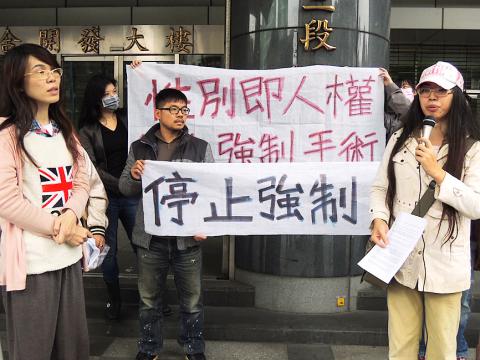Gender rights activists congregated outside a conference on sexual violence yesterday to protest against the rule that people must undergo gender reassignment surgery to officially change their gender on identity cards. The activists said the rule was a form of sexual violence.
Holding a giant banner that read: “Gender is a right, stop forced gender reassignment surgery,” gender rights activists rallied outside the conference in New Taipei City’s (新北市) Sindian District (新店), which was organized by the Ministry of Health and Welfare.
“The legal requirement that one must have surgery to officially change his or her gender doesn’t do any good, but can only harm the person wanting to change their gender,” said Abbygail Wu (吳伊婷), a member of the Intersex, Transsexual and Transgender People Care Association. “It is essentially a forcible removal of one’s reproductive organs and ability, and it is the person who has to shoulder all the risks of an operation.”

Photo: Hsieh Wen-hua, Taipei Times
“This is basically a form of violence — and cruel and unusual punishment — imposed on a group of people by the government,” she added.
Wu added that the government also requires a decision on gender to be made for a child born with both male and female reproductive organs.
“What if the gender decision that the parents make is wrong?” she said.
Jiyi Ng (吳芷儀), another member of the association and also Wu’s spouse, said that in response to their prior petition on the issue, ministry officials said that relevant medical professionals could not reach a “consensus” on abolishing the requirement during a meeting.
“Well, there was no consensus either when the requirement was made,” she said. “Not to mention that the requirement is merely an executive order, not a law, and if the ministry really wants to abolish it, it can be done today with an official notice.”
Wu said that nearly 20 countries — including South Korea, Australia, South Africa, Germany, Spain, the UK and Argentina — do not require such surgery for gender change.
“Taiwan should follow their example,” she said.

Chinese spouse and influencer Guan Guan’s (關關) residency permit has been revoked for repeatedly posting pro-China videos that threaten national security, the National Immigration Agency confirmed today. Guan Guan has said many controversial statements in her videos posted to Douyin (抖音), including “the red flag will soon be painted all over Taiwan” and “Taiwan is an inseparable part of China,” and expressing hope for expedited reunification. The agency last year received multiple reports alleging that Guan Guan had advocated for armed reunification. After verifying the reports, the agency last month issued a notice requiring her to appear and explain her actions. Guan

GIVE AND TAKE: Blood demand continues to rise each year, while fewer young donors are available due to the nation’s falling birthrate, a doctor said Blood donors can redeem points earned from donations to obtain limited edition Formosan black bear travel mugs, the Kaohsiung Blood Center said yesterday, as it announced a goal of stocking 20,000 units of blood prior to the Lunar New Year. The last month of the lunar year is National Blood Donation Month, when local centers seek to stockpile blood for use during the Lunar New Year holiday. The blood demand in southern Taiwan — including Tainan and Kaohsiung, as well as Chiayi, Pingtung, Penghu and Taitung counties — is about 2,000 units per day, the center said. The donation campaign aims to boost

The Kaohsiung Tourism Bureau audited six hotels in an effort to prevent price gouging ahead of Korean band BTS’ concert tour in the city scheduled for Nov. 19, 21 and 22 this year. The bureau on Friday said that the audits — conducted in response to allegations of unfair pricing posted on social media — found no wrongdoing. These establishments included the local branches of Chateau de Chine, Hotel Nikko, My Humble House, and Grand Hai Lai, it said, adding that the Consumer Protection Commission would have penalized price gougers had the accusations been substantiated. The bureau said the Tourism Development Act

The Central Weather Administration (CWA) said a magnitude 4.9 earthquake that struck off the coast of eastern Taiwan yesterday was an independent event and part of a stress-adjustment process. The earthquake occurred at 4:47pm, with its epicenter at sea about 45.4km south of Yilan County Hall at a depth of 5.9km, the CWA said. The quake's intensity, which gauges the actual effects of a temblor, was highest in several townships in Yilan and neighboring Hualien County, where it measured 4 on Taiwan's seven-tier intensity scale, the CWA said. Lin Po-yu (林柏佑), a division chief at the CWA's Seismological Center, told a news conference